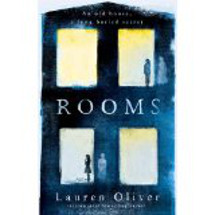Rooms by Lauren Oliver

Hodder and Stoughton, 2014. ISBN 9781444760774
(Age: Adult - Senior secondary) Recommended. 'People, Caroline
thought were like houses. They could open their doors. You could
walk through their rooms and touch the objects hidden in their
corners. But something - the structure, the wiring, the invisible
mechanism that kept the whole thing standing - remained invisible,
suggested only by the fact of its existence at all' p310. This is
the premise behind Lauren Oliver's latest book. A premise she
explores through the creation of a house in Coral River which is
initially inhabited by the ghosts of Margaret and Alice. But their
tenuous peace is rudely interrupted when the current owner of the
house, Richard Walker dies and his somewhat estranged and definitely
dysfunctional family return to 'clean up'. The reader is introduced
to Richard's alcoholic ex-wife Caroline, her sex crazed daughter,
Minna and barely functioning son, Trenton. As the family cleans out
each room the reader is given background commentary of events that
have taken place both in the lives of the living and the dead: some
that are shocking and others that are just sad. As the traumatic
days before Richard's Memorial service pass secrets and lies are
revealed. To add to the mix another ghost arrives and a strange girl
enters Trenton's life who in the end could be his saviour.
While the story is a jigsaw of events in its structure it is bound
together by the remembrances of all of these personalities and the
reader's desire to know the truth behind their apparently
dysfunctional lives. Yet despite their behaviour it is difficult to
really dislike any of the characters especially as more and more of
their history is revealed. The death of a family member, as always,
evokes memories of forgotten times, both pleasurable and disturbing.
A bright light of the narrative is Minna's young daughter Amy, who
while being aware of the ghosts is innocent in her perception.
While this novel is 'disturbing' it is not the supernatural that
makes it so. It is the tragedy of these people's lives and the truth
of what Trenton says at the end that, 'The past 'comes' along with
you whether you want it to or not' p336.
Barb Rye